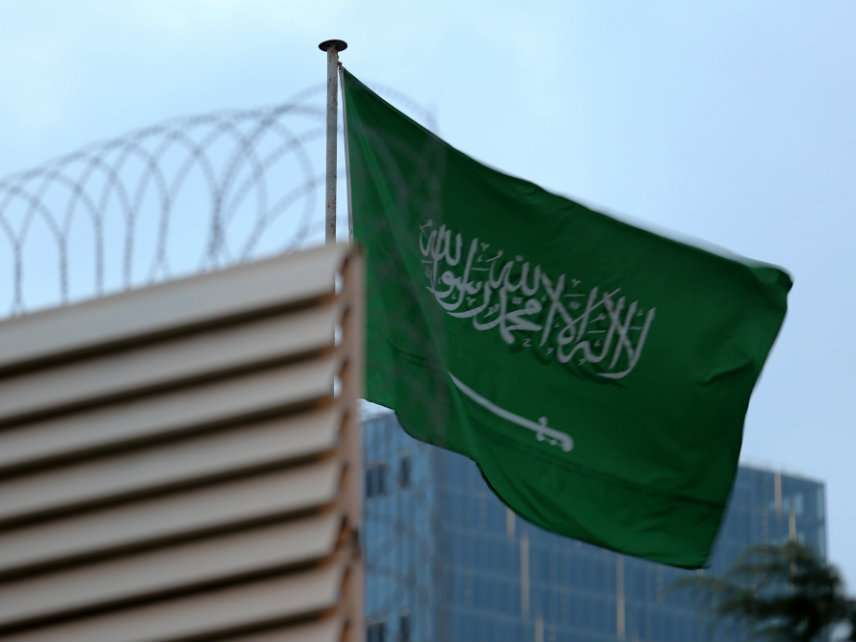Last Column From Khashoggi Warns About State-Spread Fake News. Americans Should Take Note: Reason Roundup
Plus: Rep. Amash moves to limit weapons sales to Saudis while evangelical leaders defend them.

Free minds need a free press. In Freedom House's most recent global liberty index, "only one country in the Arab world"—Tunisia—was classified as free and only three were deemed partly free. "As a result, Arabs living in these countries are either uninformed or misinformed," lamented Jamal Khashoggi, the Saudi journalist whose disappearance and probable murder has set about international melee.
People in these countries "are unable to adequately address, much less publicly discuss, matters that affect the region and their day-to-day lives," Khashoggi continues. "A state-run narrative dominates the public psyche, and while many do not believe it, a large majority of the population falls victim to this false narrative. Sadly, this situation is unlikely to change."
Khashoggi's words ring especially haunting considering the circumstances. The Washington Post published Khashoggi's final column—headline: "What the Arab world needs most is free expression"—after giving up hope that he would return alive. In a note preceding the column, Post Global Opinions Editor Karen Attiah explains that Khashoggi had filed the column not long before he disappeared in Istanbul. "The Post held off publishing it because we hoped Jamal would come back to us so that he and I could edit it together," writes Attiah. "Now I have to accept: That is not going to happen."
That Khashoggi's disappearance has captured U.S. media attention for days is itself something of an anomaly. Those intimately familiar with censorship in some regimes note that not only does Saudi Arabia mistreat media as a matter of course, but Turkey—now emerging as a vindicator of Khashoggi's death—is also absolutely awful when it comes to censoring and jailing journalists, among other thuggish things. Many have suggested that for Turkish leaders, it's Saudi aggression on their soil that stings, not the suppression of someone for speaking their mind.
The potentially brutal nature of Khashoggi's killing may explain some of the heightened attention here. But Khashoggi's publication by prestigious western outlets like The Washington Post is probably a better indicator of why we're taking note.
Of course, some corners of U.S. culture are aggressively downplaying the significance of the alleged Khashoggi killing—a killing which was incredibly painful and brutal, according to Turkish authorities who've obtained audio recordings from the Saudi consulate. The audio allegedly captures Khashoggi screaming as he's being dismembered alive.
"You've got one journalist — who knows?" opined Christian Broadcasting Network cryptkeeper Pat Robertson. "Was it an interrogation? Was he assassinated? Were there rogue elements? Who did it?…You've got $100 billion worth of arms sales…we cannot alienate our biggest player in the Middle East."
Robertson's words echo those of President Trump, who has also been quick to cast doubt on any official Saudi malfeasance here and suggested that they're too good of allies (allie$?) to risk enraging. (Trump would much rather sanction our southern neighbors for failing to block brown people from coming here.)
At least a few in Congress are rejecting this Republican front, though. For instance, Rep. Justin Amash (R–Mich.) announced yesterday that he's cosponsoring legislation to block U.S. arms sales to the Saudis.
I've joined as an original cosponsor of @RepMcGovern's bill to prohibit military assistance and arms sales to Saudi Arabia unless @SecPompeo certifies that the Saudi government was not responsible for #JamalKhashoggi's disappearance, imprisonment, or death. pic.twitter.com/jM5uSBDRUS
— Justin Amash (@justinamash) October 17, 2018
FREE MARKETS
"Amazon has hired more than 150 Ph.D. economists in the past five years, making them the largest employer of tech economists. In fact, Amazon now has several times more full time economists than the largest academic economics department." https://t.co/eXT40GJv1C
— Walter Olson (@walterolson) October 17, 2018
QUICK HITS
- Liz Wolfe takes aim at the coverage of Sen. Ted Cruz vs. Beto O'Rourke, noting that "tons of Texans probably haven't even read the fawning Beto-is-a-punk-rocker-who-skateboards headlines or perused Cruz's voting record, despite years of being represented by him." This sort of apathy, suggests Wolfe, "isn't a bad thing––it frees people's energy up to focus on things that really matter: their families, their jobs, and drinking Tecate at a Tex-Mex restaurant on a Tuesday night."
- "The Trumpian taunt is a trap," writes Masha Gessen. Elizabeth Warren played right into it.
- A new self-lubricating condom can "withstand 1,000 thrusts."
- Get ready for the return of the plague.
- Newly released video contradicts a Chicago cop's explanation of why he shot an autistic teen.
Which hot new lip gloss goes with this? Whichever the state decides will be the only lip gloss! https://t.co/lmRONKYnRf
— Shoshana Weissmann, Regulatory Reform Muse (@senatorshoshana) October 18, 2018


Show Comments (186)